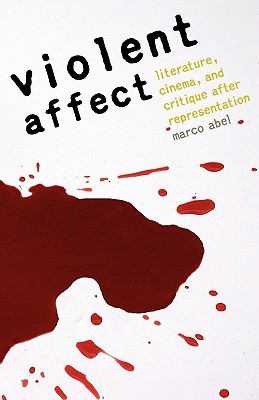
- We will send in 10–14 business days.
- Author: Marco Abel
- Publisher: University of Nebraska Press
- ISBN-10: 0803224818
- ISBN-13: 9780803224810
- Format: 14.1 x 21.5 x 2 cm, softcover
- Language: English
- SAVE -10% with code: EXTRA
Reviews
Description
Violence: most of us would be happy if we never had to experience it, and many are driven by the belief that nonviolent spaces exist. In Violent Affect, however, Marco Abel starts from a different, potentially controversial assumption: namely that violence is all-pervasive by ontological necessity. In order to work through the implications of this provocation, Abel turns to literary and cinematic works such as those by Don DeLillo, Bret Easton Ellis, Mary Harron, Patricia Highsmith, the Coen Brothers, and Robert DeNiro, contending that we do not even know what violent images are, let alone how they work and what they do. Countering previous studies of violent images based on representational and, consequently, moralistic assumptions, which, Abel argues, inevitably reinforce the very violence they critique, Violent Affect instead turns to the concept of "affect" as a means to explain how violent images work upon the world. Arguing for what he calls a "masocritical" approach to violence, Abel's analysis attends to the affects inherent to violent images with the goal of momentarily suspending judgment of them, thus allowing for new, unanswered critical questions about the issue of violence to emerge. Abel suggests that shifting from representational understandings of violence toward an account of its affective forces is a necessary step in developing more ethical tools to intervene in the world-for acting upon it for the betterment of the future. Marco Abel is an assistant professor of English and film studies in the Department of English at the University of Nebraska-Lincoln. His essays and reviews have appeared in PMLA, Angelaki, Senses of Cinema, Modern Fiction Studies, and Quarterly Review of Film and Video, among other publications.
EXTRA 10 % discount with code: EXTRA
The promotion ends in 20d.13:24:48
The discount code is valid when purchasing from 10 €. Discounts do not stack.
- Author: Marco Abel
- Publisher: University of Nebraska Press
- ISBN-10: 0803224818
- ISBN-13: 9780803224810
- Format: 14.1 x 21.5 x 2 cm, softcover
- Language: English English
Violence: most of us would be happy if we never had to experience it, and many are driven by the belief that nonviolent spaces exist. In Violent Affect, however, Marco Abel starts from a different, potentially controversial assumption: namely that violence is all-pervasive by ontological necessity. In order to work through the implications of this provocation, Abel turns to literary and cinematic works such as those by Don DeLillo, Bret Easton Ellis, Mary Harron, Patricia Highsmith, the Coen Brothers, and Robert DeNiro, contending that we do not even know what violent images are, let alone how they work and what they do. Countering previous studies of violent images based on representational and, consequently, moralistic assumptions, which, Abel argues, inevitably reinforce the very violence they critique, Violent Affect instead turns to the concept of "affect" as a means to explain how violent images work upon the world. Arguing for what he calls a "masocritical" approach to violence, Abel's analysis attends to the affects inherent to violent images with the goal of momentarily suspending judgment of them, thus allowing for new, unanswered critical questions about the issue of violence to emerge. Abel suggests that shifting from representational understandings of violence toward an account of its affective forces is a necessary step in developing more ethical tools to intervene in the world-for acting upon it for the betterment of the future. Marco Abel is an assistant professor of English and film studies in the Department of English at the University of Nebraska-Lincoln. His essays and reviews have appeared in PMLA, Angelaki, Senses of Cinema, Modern Fiction Studies, and Quarterly Review of Film and Video, among other publications.


Reviews